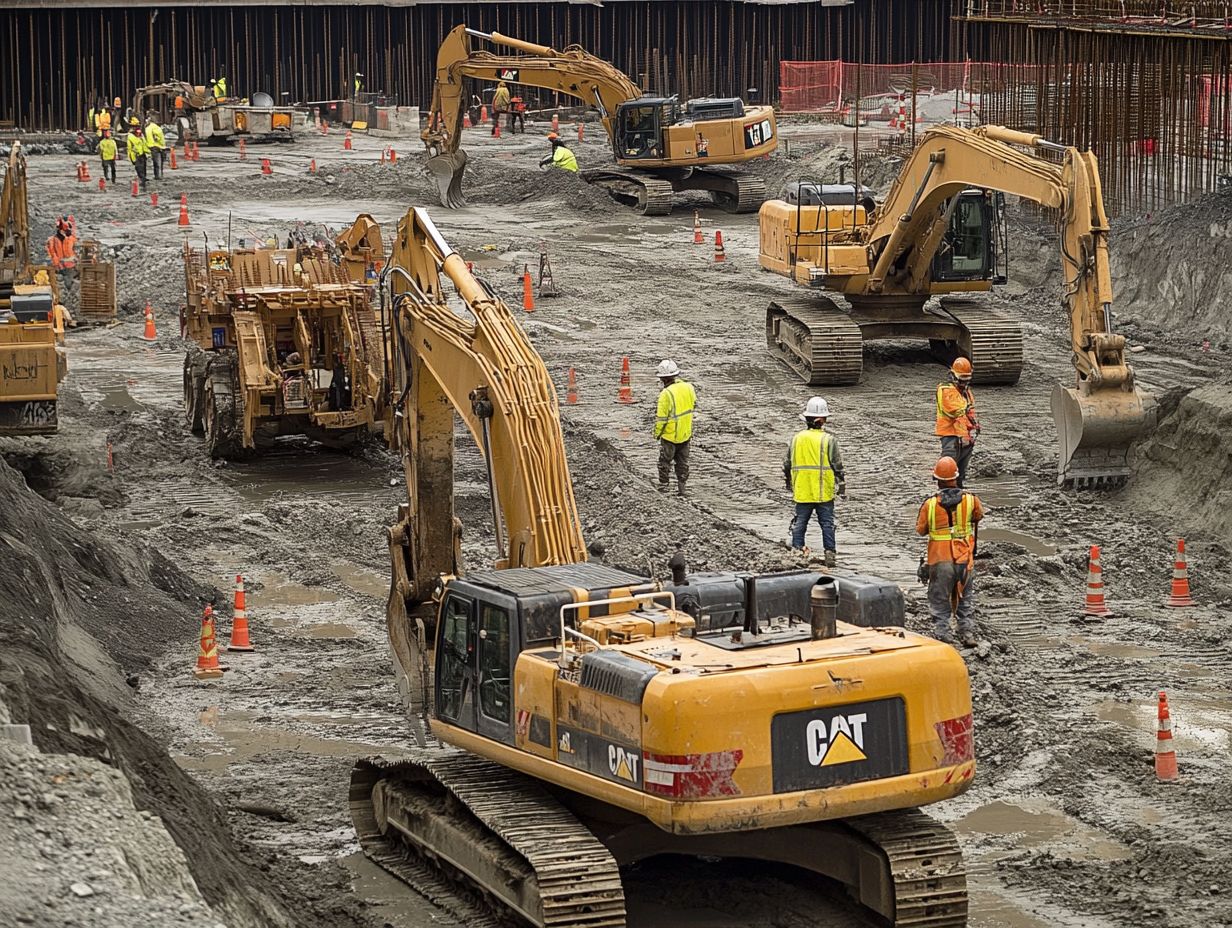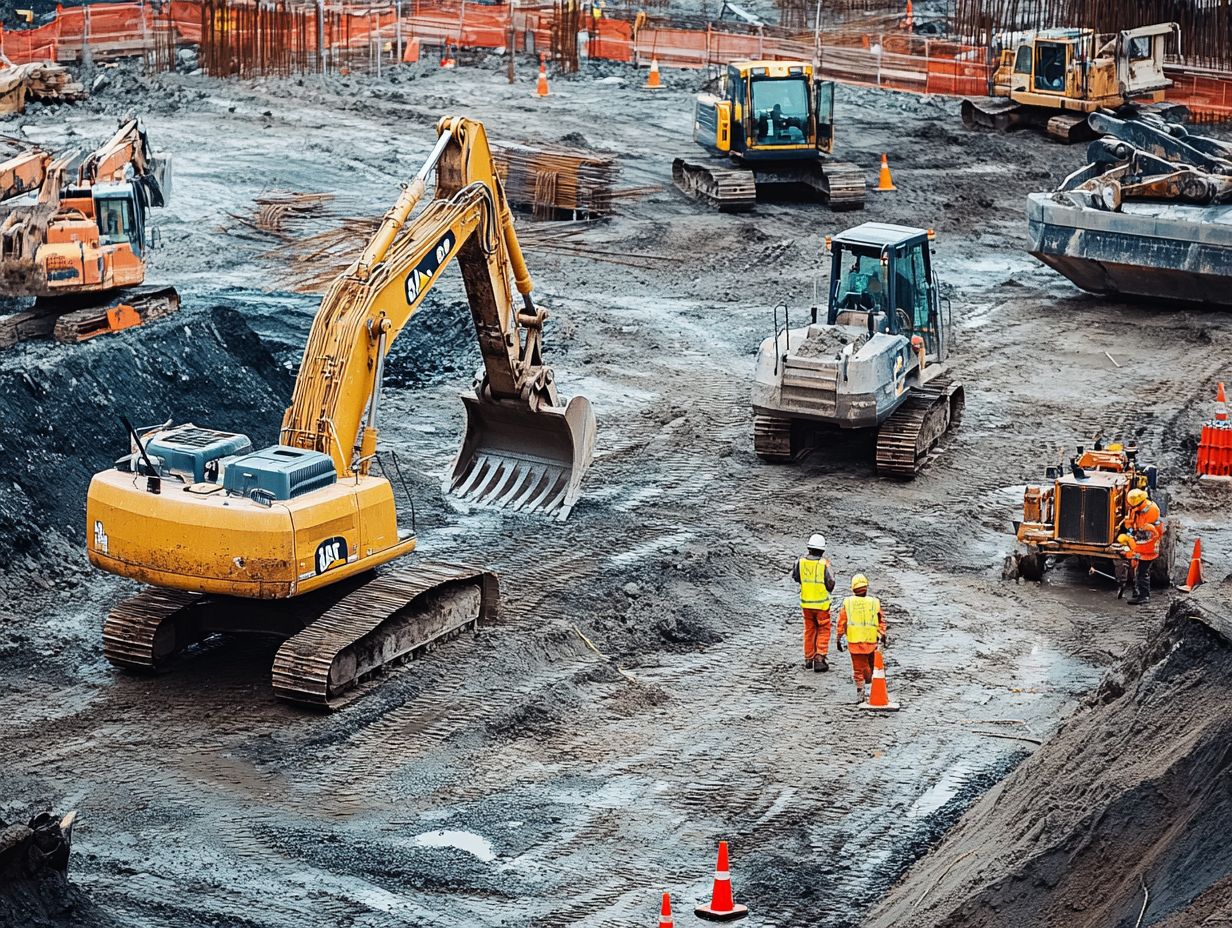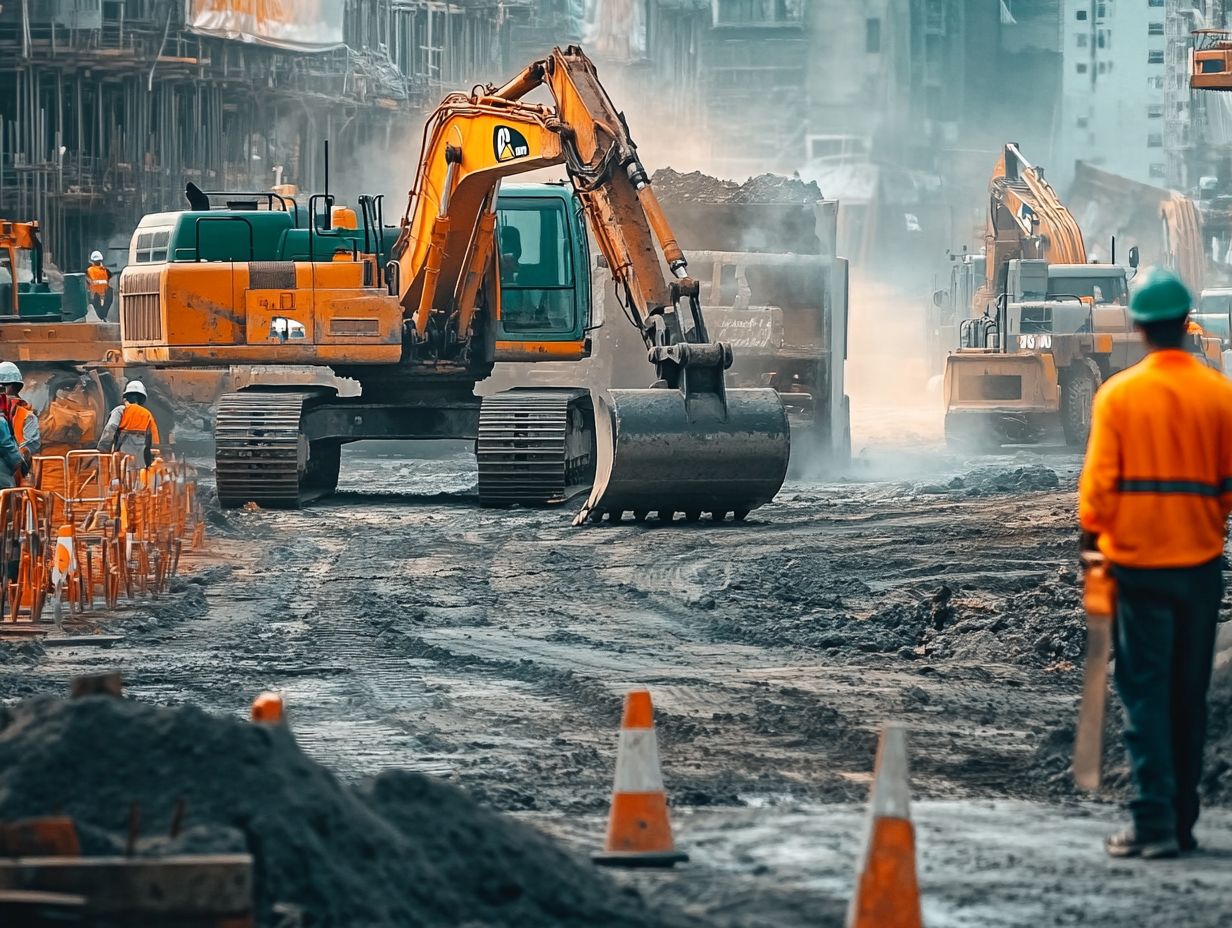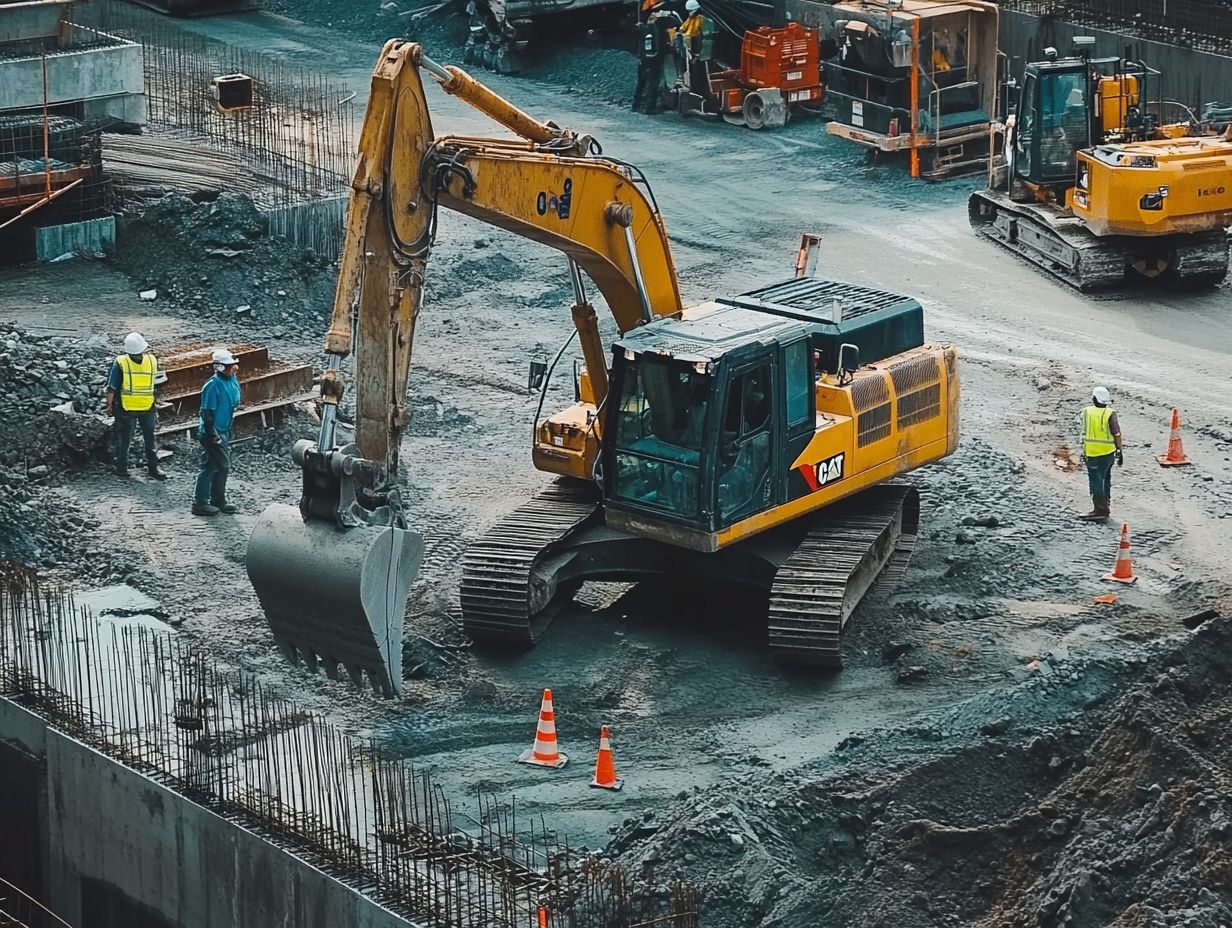Understanding Coverage for Heavy Equipment
Heavy equipment coverage is vital for protecting your valuable machinery from unexpected risks.
Whether you own excavators, cranes, or bulldozers, it s essential to understand the right types of coverage, such as liability and physical damage.
This article explores various coverage options, factors that influence costs, and tips for selecting the ideal policy tailored to your specific needs.
By grasping the nuances of heavy equipment insurance, you can make informed decisions that safeguard your investment and provide peace of mind.
Contents
- Key Takeaways:
- Types of Heavy Equipment Coverage
- Factors Affecting Coverage Cost
- Choosing the Right Coverage for Your Needs
- Frequently Asked Questions
- What is covered under heavy equipment insurance?
- Are all types of heavy equipment covered under the same policy?
- Do I need heavy equipment insurance if my equipment is only used occasionally?
- Can I add coverage for my heavy equipment to my existing insurance policy?
- Is operator error covered under heavy equipment insurance?
- Are there any exclusions to heavy equipment insurance coverage?
Key Takeaways:

- Understanding the different types of heavy equipment coverage, such as liability and physical damage, helps you choose the right coverage for your needs and protect your investment.
- Factors like the type of equipment, usage, location, and driver experience impact the cost of coverage for heavy equipment.
- Evaluating your coverage needs and comparing quotes from different providers ensures you have adequate protection for your heavy equipment.
What is Heavy Equipment Coverage?
Heavy equipment coverage is a specialized insurance policy designed to protect contractors and businesses in the construction sector and similar fields. It encompasses a variety of equipment, including heavy machinery and essential contractors’ tools, ensuring your business is financially protected against risks like theft, accidents, and natural disasters. Understanding what coverage for heavy-duty vehicles entails can further enhance your protection strategy.
Understanding the details of heavy equipment insurance is vital for managing your insurance needs and avoiding potential policy gaps. For those with specialty trailers, understanding coverage for specialty trailers can help prevent significant financial setbacks.
This type of coverage includes protection against risks like mechanical breakdowns, vandalism, and liability for injuries due to faulty equipment. For contractors, understanding coverage for specialized vehicles is crucial, as the financial consequences of equipment damage can be enormous; any downtime can severely impact productivity and revenue.
Specialized insurance offerings are invaluable, providing comprehensive plans tailored to the unique demands of the construction industry.
By securing heavy equipment coverage, you are not just protecting your valuable investments; you are also ensuring that your operations run smoothly, even during unexpected challenges, such as understanding coverage for antique tractors.
Types of Heavy Equipment Coverage
You’ll find a range of heavy equipment coverage options designed to meet the diverse needs of contractors. Each type is crafted to address specific risks associated with heavy construction operations, including coverage for specialty vehicles and the intricacies of equipment management.
Liability Coverage
Liability coverage is a key pillar of heavy equipment insurance, serving as essential protection for contractors against claims that arise from injuries or damages linked to their operations.
This coverage shields you from substantial financial burdens that can result from accidental damage to public utilities or unforeseen incidents on the job site. Understanding how insurance pricing affects your overall coverage costs is also crucial, as it directly influences your ability to manage risks effectively.
By regularly evaluating your specific insurance needs, you can ensure you have adequate protection tailored to your unique operations, ultimately safeguarding your business against potentially devastating losses.
Physical Damage Coverage
Physical damage coverage is a vital component of heavy equipment insurance that protects your machinery from various threats, including theft, vandalism, and natural disasters.
With this coverage, you gain confidence knowing your investment is secure! It ensures your financial assets are protected against unforeseen incidents that could disrupt your operations. Typically, it covers damage from accidental collisions, fire, and equipment breakdown, allowing your business to recover quickly without hefty out-of-pocket expenses.
Understanding equipment replacement costs is essential, as precise evaluations can significantly affect your insurance premiums and coverage choices. This knowledge enhances your risk management strategies and enables informed decisions that promote the longevity and sustainability of your operations.
Additional Coverage Options

Beyond standard liability and physical damage coverage, you can explore additional options, such as coverage for rental equipment, designed to tackle the unique risks associated with heavy equipment and construction projects.
Consider options like operator error insurance insurance that protects against accidents caused by mistakes made by equipment operators and rental equipment protection, which shields you from losses while using rented machinery. Comprehensive coverage plans provide peace of mind, mitigate financial risks, and can be tailored to meet your specific needs and operational challenges.
Evaluate each project’s demands and identify potential hazards. This helps you create a personalized insurance strategy that effectively protects your business from unforeseen events, enhancing both security and stability in a competitive environment.
Factors Affecting Coverage Cost
The cost of heavy equipment insurance can vary widely, influenced by several factors that you, as a contractor, should consider. By doing so, you can optimize your coverage while managing your expenses.
Type of Equipment
The type of equipment you insure plays a crucial role in determining the overall cost of heavy equipment insurance. Different machinery and tools come with varying levels of risk.
For instance, heavy machinery like excavators and bulldozers not only have steep replacement costs but also carry operational risks that can lead to higher premiums. In contrast, smaller equipment such as skid steers may carry lower values and risks, yet they still require sufficient coverage for unconventional vehicles to address unforeseen liabilities.
For certain high-risk equipment types, specialized insurance offerings become essential to ensure protection against potential losses unique to your operations. Evaluate the specific equipment you utilize, its value, and the nature of your projects to make informed decisions when selecting your insurance policies.
Usage and Location
The usage and location of heavy equipment are pivotal in determining your insurance costs. These elements are closely tied to associated risks and potential liabilities.
As a contractor, assess how often your machinery operates and the specific environments in which it s used. Job sites with greater hazards like those subject to extreme weather conditions or located in urban areas can lead to elevated insurance premiums. Frequent equipment use may indicate to insurers a higher likelihood of claims, impacting your pricing.
To keep these costs in check, invest in robust job site protections. Partnering with an experienced insurance broker can help you uncover tailored policies that reflect your unique operational needs, ensuring you remain adequately covered while managing your expenses effectively.
Contact your insurance broker today to find the best coverage for your needs!
Driver Experience and History
Driver experience and history are pivotal elements that insurers scrutinize when determining coverage costs for heavy equipment. They directly influence the likelihood of accidents and claims.
A seasoned operator usually pays lower premiums than someone with minimal experience. Their familiarity with navigating challenging situations often leads to safer driving practices. However, any previous incidents be they minor fender benders or major mishaps can significantly impact insurance pricing. Insurers know that a track record of accidents suggests a higher risk.
This emphasizes the importance of undergoing comprehensive training, not just to refine your skills but also to demonstrate your commitment to safety. It s crucial to review your insurance needs to ensure that all potential risks linked to operating heavy machinery are adequately covered, providing you with peace of mind and financial protection in case of an accident.
Choosing the Right Coverage for Your Needs

Selecting the right coverage for your heavy equipment insurance needs requires a solid understanding of your business operations and the specific risks you face. For instance, knowing what coverage for construction vehicles entails is essential for securing optimal financial protection tailored to your unique circumstances.
Evaluating Your Coverage Needs
Evaluating your coverage needs is a crucial step in securing the right heavy equipment insurance, including understanding coverage for transportation companies, that aligns with your financial planning and operational realities.
By carefully assessing your specific equipment and the associated risks, you can ensure you have the appropriate level of protection. Customized coverage options provide the flexibility to address your individual requirements.
Specialized insurance offerings can cater to your varying needs, effectively reducing potential financial losses. Act now to boost your peace of mind and secure your future!
Comparing Quotes and Policies
Comparing quotes and policies from various insurance providers is vital for discovering the best coverage options at competitive rates tailored to your heavy equipment insurance needs.
This process involves more than just requesting multiple quotes; it requires careful analysis of the precise terms and conditions each insurer offers. Key factors such as deductibles, coverage limits, and additional benefits significantly influence which policy provides the best protection.
Looking at quotes from different providers helps you find the best coverage at competitive rates. Engaging an insurance broker can be a game-changer. They expertly navigate the intricate landscape of options, identify policy gaps, and ensure you secure a plan tailored to your unique requirements. This savvy approach could ultimately save you both time and money.
Frequently Asked Questions
What is covered under heavy equipment insurance?
Heavy equipment insurance typically covers damages or losses from accidents, vandalism, theft, and natural disasters for equipment like bulldozers, cranes, and excavators. For those looking for more information, it’s important to understand coverage for non-standard vehicles.
Are all types of heavy equipment covered under the same policy?

No, different equipment needs different insurance depending on their specific risks and usage. Discussing your equipment with an insurance agent is essential to determine the appropriate coverage.
Do I need heavy equipment insurance if my equipment is only used occasionally?
Yes, even if your equipment is used occasionally, having insurance is important in case of unexpected accidents or damages. Some states may require you to have insurance for certain types of heavy equipment.
Can I add coverage for my heavy equipment to my existing insurance policy?
Absolutely! Many insurance companies let you add coverage for your heavy equipment to your existing policy.
Consulting with an agent ensures your equipment is adequately covered.
Is operator error covered under heavy equipment insurance?
Typically, operator error mistakes made while using the equipment is not covered under heavy equipment insurance.
If an accident results from faulty equipment or manufacturer defects, it may be covered by your policy.
Are there any exclusions to heavy equipment insurance coverage?
Yes, coverage can vary based on the insurance company and policy.
Common exclusions often include intentional damage, wear and tear, and losses that happen while the equipment is being transported.






